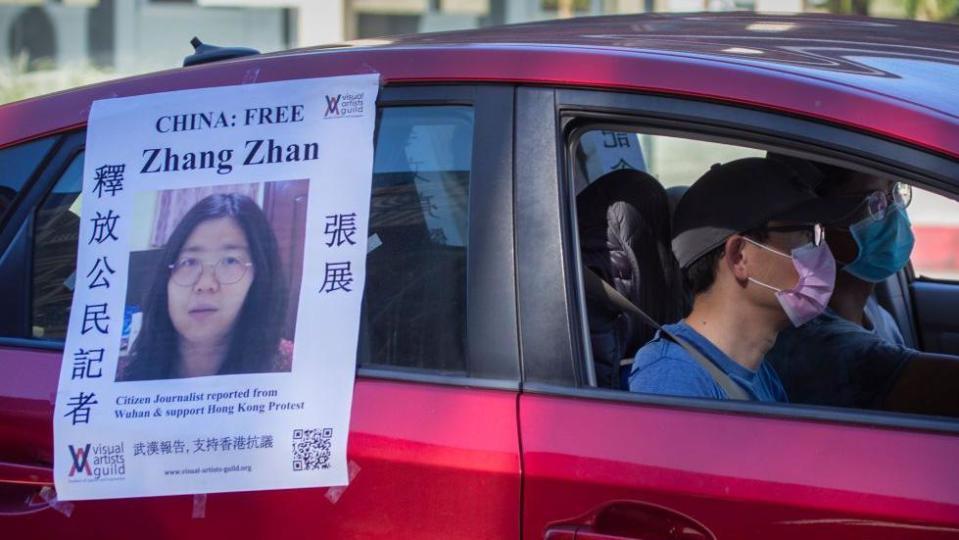China due to free vlogger who filmed Wuhan lockdown
- Oops!Something went wrong.Please try again later.
The whereabouts of a Chinese citizen journalist jailed for covering the early days of the Covid-19 pandemic is still unknown a day after she was expected to have been released, having served her four year sentence.
Supporters say they are unclear if Zhang Zhan had actually been freed - although rights groups had said authorities were likely to keep tight-lipped on her status.
The 40-year-old former lawyer is one of several activists who had run into trouble with Chinese authorities for their Covid-19 reporting. Some have been detained while others have gone missing.
She was found guilty of "picking quarrels and provoking trouble", a frequent charge against activists in China.
Media watchdogs and human rights groups had said that Ms Zhang was wrongfully prosecuted. They had called for her release because of her deteriorating health.
There is "huge concern" about the safety of Ms Zhang after she is released, Reporters Without Borders advocacy officer Aleksandra Bielakowska said.
"In China, journalists detained for their work often remain under detention or surveillance even upon completion of their prison terms," she said.
"I honestly think we will have no updates soon. They will probably try to detain her in secret location, or keep her out of the eye sight for some time."
One of Ms Zhang's lawyers told BBC Chinese that her "personal freedom will still be restricted", adding that she will now live with her parents in Shanghai.
From her base in Shanghai, Ms Zhang travelled to Wuhan in February 2020 to document what she saw on the streets and in hospitals.
Her livestreams and essays were widely viewed on social media, and she continued to produce them despite threats from authorities.
One of her livestreamed clips showed how she kept her camera rolling while an official warned her to "stop filming or [he would] get mad".
"Maybe I have a rebellious soul... I'm just documenting the truth. Why can't I show the truth?" she said in an interview with an independent filmmaker, a clip of which was obtained by the BBC.
"I won't stop what I'm doing, because this country can't go backwards."
This was thought to be her last interview before she was detained.
Ms Zhang had posted more than 100 videos on her YouTube Channel, WeChat and Twitter, before being reported missing on 14 May 2020.
The next day, authorities announced that she was detained by police in Shanghai. She was charged in November that year and was sentenced the following month.
Ms Zhang went on a hunger strike in the first few months of detention, and her lawyer had said then that she was being force-fed through a tube.
She remained on partial strike until July 2023, when her weight had reportedly plummeted to just 37kg - half of what it was before her detention.
She was also suffering from severe malnutrition, gastrointestinal disease, and low white blood cell count, RSF said.
"Journalist Zhang Zhan, who courageously risked her life by informing the public on the outbreak of Covid-19 in Wuhan, is at risk of dying if she does not receive extensive medical treatment," the organisation said in a statement in September last year.
The significance of Ms Zhang's case will rest on what happens after she is released, said Jerome Cohen, an expert in Chinese law.
"Most released human rights advocates are kept quiet through informal means of suppression. Some try to leave the country and are successful in continuing to report on human rights violations in China but they are exceptions," said Prof Cohen.
A lawyer for Ms Zhang said her family had been "frequently approached" by the police during her detention, and they were instructed not to discuss the case with others.

"Citizen journalists were the only source of uncensored, first-hand information about the Covid-19 outbreak in China.
"Because they work independently of state-controlled media, citizen journalists face constant harassment for exposing information the government would rather keep quiet," Amnesty International said in a statement.
When the pandemic first struck in early 2020, the Chinese internet - despite being heavily censored - was inundated with messages describing government cover-ups and failures in the healthcare system.
But the state's censorship machine doubled down to suppress the unprecedented online anger.
Several channels went quiet, posts were swiftly erased and some activists like Ms Zhang received explicit warnings from the authorities.
Among the most well-known internationally was the case of whistleblower doctor Li Wenliang, who had tried to warn his colleagues about a "Sars-like virus".
Dr Li died in February 2020 after contracting Covid-19. It was later revealed that he had been under investigation for "disturbing social order" by "making false comments". His death sparked an outpouring of support on social media, but the posts were periodically scrubbed.
The Communist Party filled state media with positive stories about its Covid-19 response. In February 2023, the party's top leaders declared "victory" over the virus and described the government’s response to Covid-19 as “a miracle”.
Additional reporting by Sylvia Chang

